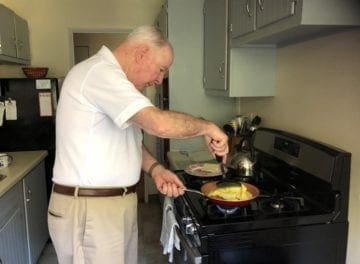Did you know that in the United States every 40 seconds someone has a stroke? It’s true!
Stroke is a leading cause of serious long-term disability. Stroke reduces mobility in more than half of stroke survivors. It can change the way we see, move, taste, think, and more. Therefore, it is important to see a driving specialist and have a comprehensive driving evaluation after a stroke.
The good news is that many are able to return to driving after a stroke!
Partnering with an occupational therapist with specialized training in driver rehab, like Susie Touchinsky, is a great way to help know if you can return to driving after a stroke!
Meet Patrick

Patrick returns to driving after a stroke.
I’d like you to meet Patrick. He is a stroke survivor. After a stroke stole his ability to express himself, many counted him out. Too often we associate language with ability and when a client loses expressive communication it can be tough for experts and families to understand what is working and what is damaged.
This is when I love to turn to my roots as an occupational therapist. When it is hard for a client to speak or communicate, paper and pencil tests need to replaced with something better.
Occupational therapists are experts in watching human behavior and understanding a client’s skill. We have a special test called the Assessment of Motor & Process Skills (AMPS). This test requires advanced training, calibration, and certification, but let me tell you, it is worth it! I can have my clients complete the AMPS by doing simple, everyday activities like cooking or cleaning. There’s growing research connecting AMPS performance to driving (Dickerson et al, 2011). So much so, that when Patrick made me the most beautiful omelet, I gained great confidence in him and his skills and knew it was time for his on-the-road driving evaluation.
Patrick completed his driving evaluation and did a phenomenal job! He demonstrated fitness to drive and has returned to driving after his stroke!
Resources & References:
- Ready to return to driving after a stroke? Contact Adaptive Mobility to learn how we can help!
- Dickerson, A. E., Reistetter, T., Schold Davis, E., & Monahan, M. (2011). Evaluating driving as a valued instrumental activity
of daily living. American Journal of Occupational Therapy, 65, 64–75. doi: 10.5014/ajot.2011.09052
